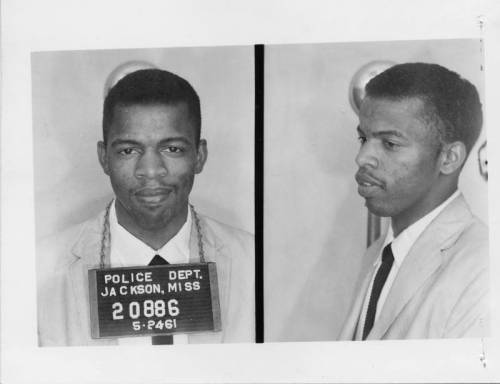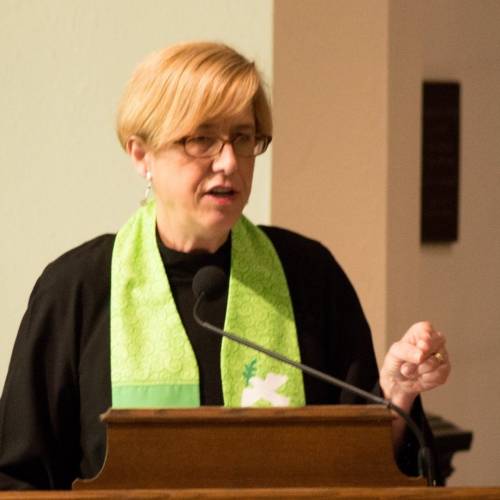Good Trouble
Can we see our overwhelming challenges in the church as blessings?
by Susan Rothenberg

Recently, I found myself in a room with about 40 pastors of various colors and ages who had gathered to hear a famous speaker talk about issues facing the church today. After the speaker left for the airport, we had 90 minutes of open space time.
After a few minutes of awkward silence, one by one, the pastors stood to speak.
Most of them were pastors I did not know well, but certainly knew of. They were pastors who had served long and well in their congregations. They were pastors I respected. They were pastors who seemed to have it all together, leading churches that are thriving, at least from my perspective.
One by one, they spoke.
They talked about their deep frustration about being leaders in a post-Christendom era. So many people have left the church. The ones who have stayed do not want to be moved out of their comfort zone by a Gospel which has become increasingly uncomfortable for many pastors to preach.
They talked about racism in the pews and in public. They talked about their fear when they climb into the pulpit, wanting to cry out the truth, but opting to say nothing that might be construed as too “political.” Some of the black pastors in our group asked the white pastors when they are going to get over being so scared. Other black pastors said they have given up on the white church.
Some choked back tears as they described presiding at the funerals of affluent teenagers and other young people who committed suicide because their identities as children of God just weren’t enough to make it worth living in a world where they need to be perfect so they’ll get into the right college or live a good life.
A few pastors were courageous enough to say they aren’t so sure the institutional church is worth saving. And even if it is, they are not so sure they will stick around to do it.
It was one of those very rare occasions when I had no words. All I wanted to do was take off my shoes, kneel on holy ground and weep with my colleagues in confession, lament, and profound humility for a world so broken that evil seems intent on tearing us apart, blowing us to bits, and swallowing us whole.
As I have reflected on what I heard that day, I thought about Eugene Peterson’s beautiful rendering of The Beatitudes:
You’re blessed when you’re at the end of your rope. With less of you there is more of God and his rule.
You’re blessed when you feel you’ve lost what is most dear to you. Only then can you be embraced by the One dearest to you.
You’re blessed when you’re content with just who you are—no more, no less. That’s the moment you find yourselves proud owners of everything that can’t be bought.
You’re blessed when you’ve worked up a good appetite for God. His food and drink is the best meal you’ll ever eat.
You’re blessed when you care. At the moment of being ‘care-full,’ you find yourselves cared for.
You’re blessed when you get your inside world—your mind and heart—put right. Then you can see God in the outside world.
You’re blessed when you can show people how to cooperate instead of compete or fight. That’s when you discover who you really are, and your place in God’s family.
You’re blessed when your commitment to God provokes persecution. The persecution drives you even deeper into God’s kingdom. Not only that— count yourselves blessed every time people put you down or throw you out or speak lies about you to discredit me. What it means is that the truth is too close for comfort and they are uncomfortable. You can be glad when that happens—give a cheer, even!— for though they don’t like it, I do! And all heaven applauds.
And know that you are in good company. My prophets and witnesses have always gotten into this kind of trouble.” (Matthew 5:3 – 12, The Message)
There is no doubt in anyone’s mind that religious institutions are in trouble, but reading this translation of Matthew 5 makes me think that maybe, just maybe, the trouble we are in is “good trouble.”
I do not know who originally coined the phrase, but on his Twitter feed, Georgia Congressman John Lewis often posts photos from the Civil Rights era when he was a Freedom Rider, and many of the photos have the caption, “good trouble.” Good trouble, Lewis has said, is the “way of love.”
Perhaps good trouble is also the way of love to which Jesus calls his disciples.
A way that does not lead to comfort.
A way that does not lead to success.
A way that does not lead to popularity or fame.
A way that does not lead to complacency in the face of evil.
A way that leads not to safety, but to the Cross.
If we in the Church are in good trouble, we need one another more than we ever have. We need to link arms with our brothers and sisters in ministry and walk the path of love together. We need community to hold one another up when the world sees us as not only as too political, but completely out-of-step, out-of-line, and out-of-order. Just like Jesus.
Most importantly, we need more moments of unvarnished truth-telling like that I experienced with my brothers and sisters. As one of my colleagues said after it was over, it was one of the hardest good things or one of the goodest hard things he ever did.
Which sounds an awful lot like good trouble to me.
Susan Rothenberg is  a leader in the Unglued Church Project and an at-large member of Pittsburgh Presbytery. Formerly, she has served as pastor to a small church in Pittsburgh, and currently co-moderates the presbytery’s Commission on Ministry and serves on the Anti-Racism Transformation Team. She also serves as a consultant with PneuMatrix. Prior to entering ordained ministry, she worked in marketing, advertising and public relations. She has one husband, two children, and two crazy cats. The opinions she expresses are entirely her own, so if you disagree with her, do not blame Pittsburgh Presbytery.
a leader in the Unglued Church Project and an at-large member of Pittsburgh Presbytery. Formerly, she has served as pastor to a small church in Pittsburgh, and currently co-moderates the presbytery’s Commission on Ministry and serves on the Anti-Racism Transformation Team. She also serves as a consultant with PneuMatrix. Prior to entering ordained ministry, she worked in marketing, advertising and public relations. She has one husband, two children, and two crazy cats. The opinions she expresses are entirely her own, so if you disagree with her, do not blame Pittsburgh Presbytery.